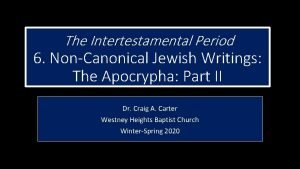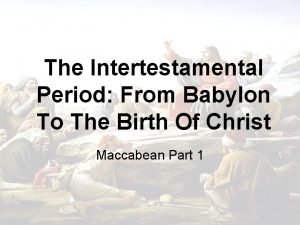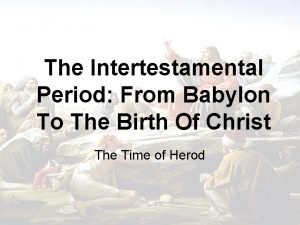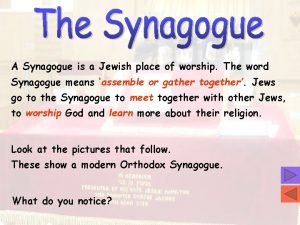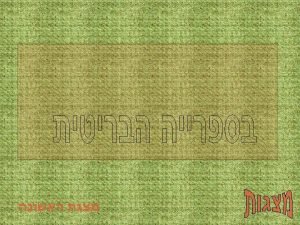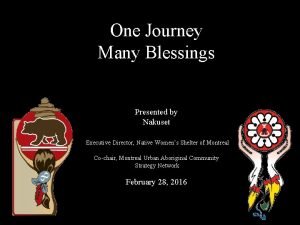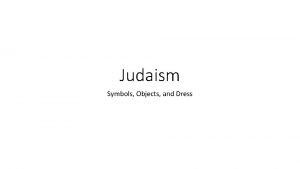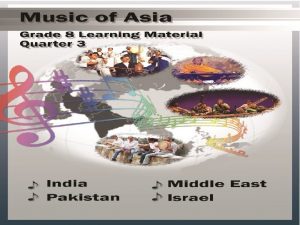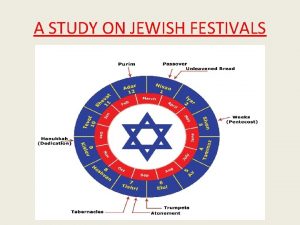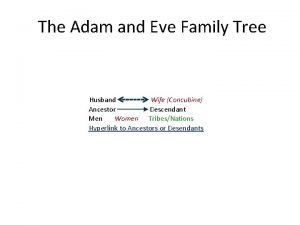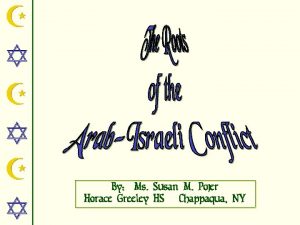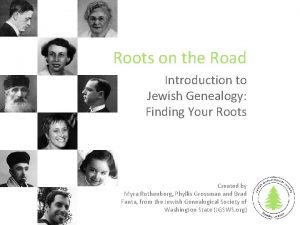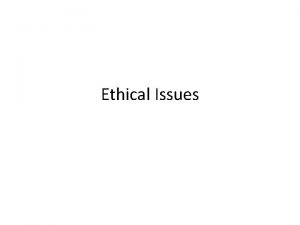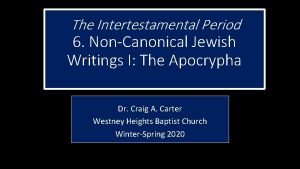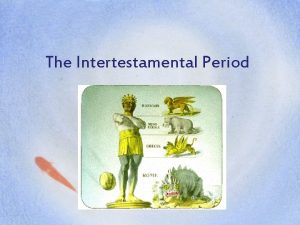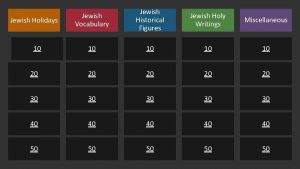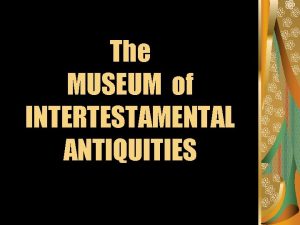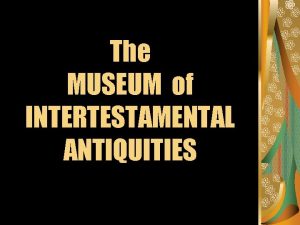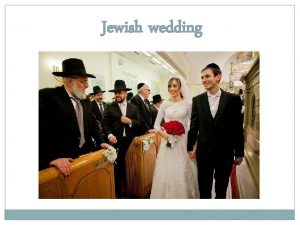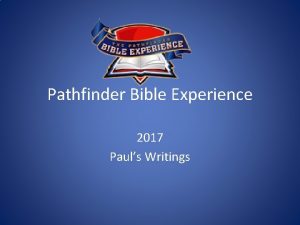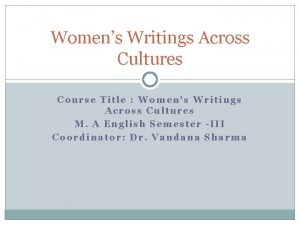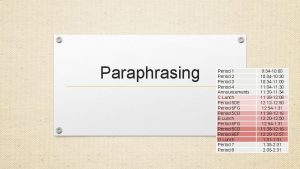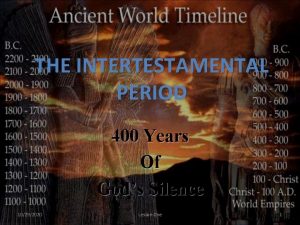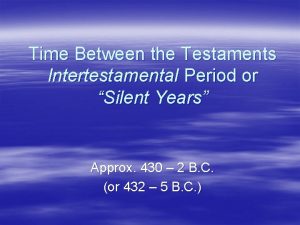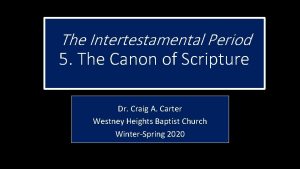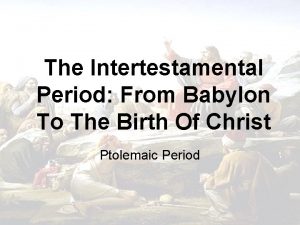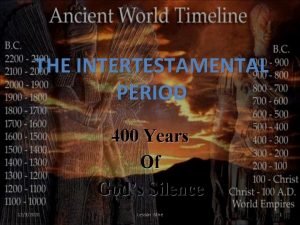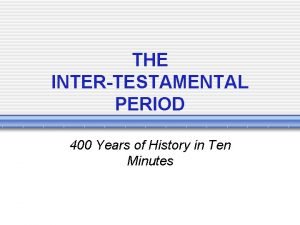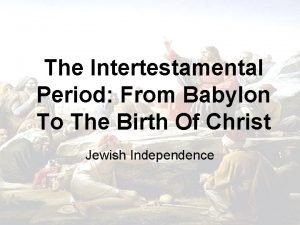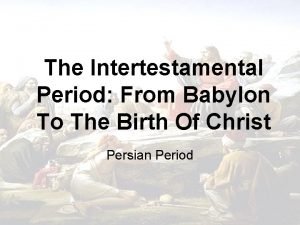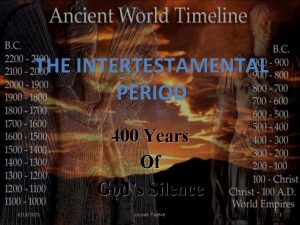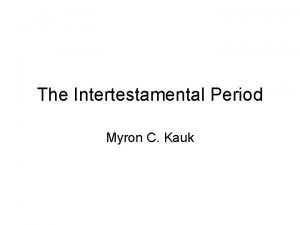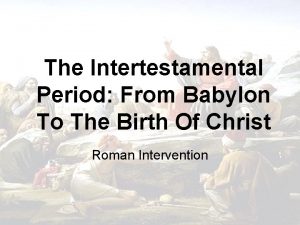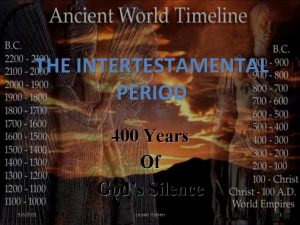The Intertestamental Period 6 NonCanonical Jewish Writings The
























- Slides: 24

The Intertestamental Period 6. Non-Canonical Jewish Writings: The Apocrypha: Part II Dr. Craig A. Carter Westney Heights Baptist Church Winter-Spring 2020


The Literature of Second Temple Judaism 586 BC - 136 AD 1. The Apocrypha – “hidden” - books & parts of books not in the Jewish canon but incl. in the Septuagint (the Gr. trans. of the Heb Bible) & written bet. 400 BC & 90 BC 2. The Pseudepigrapha - “falsely ascribed” - other Jewish rel. writings written bet. 200 BC & 200 AD 3. The Dead Sea Scrolls – Essene scrolls discovered in 1947 in caves near the Dead Sea written bet. 140 BC & 68 AD 4. The Writings of Philo – the writings of a highly educated Jew thoroughly at home in Hellenistic culture who lived in Alexandria, Egypt from 20 BC – 50 AD (a contemporary of Jesus) 5. The Writings of Josephus - the writings of a Jewish historian who joined the Romans during the Jewish wars - he lived from 37 -100 AD

Our Plan For Studying These Books • May 7 – Non-Canonical Jewish Books I: The Apocrypha • May 21 – Non-Canonical Jewish Books II: The Pseudepigrapha • May 28 – The Dead Sea Scrolls • I’m also considering spending a session on the writings of Philo & Josephus but I haven’t decided yet – maybe June 9, which would push NT Geography to June 18 or the Fall • This partly depends on which textbook we use for NT & that decision is coming soon (I’ve set aside May 22 to decide)

Revised Plan For Studying These Books • May 7 – Non-Canonical Jewish Books: The Apocrypha: Pt I • May 14 – Review of Wisdom + Prov. 1: 20 -33 • May 21 – Non-Canonical Jewish Books: The Apocrypha: Pt II • May 28 – Non-Canonical Jewish Books: The Pseudepigrapha • June 4 – The Dead Sea Scrolls • June 11 – Philo • June 18 – Josephus • June 25 – Review of Prophet + Jer. 31: 31 -40

The Apocrypha 1. 2. 3. 4. 5. 6. 7. Tobit Judith (Tobit & Judith appear after Nehemiah in the Catholic OT) 1 Maccabees 2 Maccabees (1 -2 Macc. appear after Esther) Wisdom [or Wisdom of Solomon] (appears after Song of Solomon) Ecclesiasticus [or Sirach] (after Wisdom) Baruch [the 6 th chap is sometimes given a separate title: the Epistle of Jeremiah] (after Lamentations) 8. Additions to Esther [6 extra sections scattered throughout] (appears after Judith) 9. Additions to Daniel [Susanna, Prayer of Azariah & the Song of the 3 Young Men, & Bel & the Dragon] (may appear as separate works)

The Apocrypha • We are going to look at some more of the apocryphal books & then summarize some of the ways they help us understand the NT • We are going to look at Tobit, the Additions to Daniel, the Letter of Jeremiah (aka Baruch) & Sirach (aka Ecclesiasticus)

Tobit • This is a fictional story about the problem of undeserved suffering • It is something like Job, but differs in several ways • Like Job, however, it has a happy ending • Characters • Tobit (principal character), Tobias (Tobit’s son), Anna (Tobit’s wife) • Raguel (Tobit’s relative), Sarah (Raguel’s daughter), Edna (Raguel’s wife) • God (the real hero), Raphael (an angel), Asmodeus (an evil spirit) • Tobit’s name means “goodness” & he does good deeds like helping poor Jews, esp. those who cannot afford to bury their relatives • Sarah is a young woman haunted by an evil spirit who is in love with Tobias

Tobit • Tobit is of the tribe of Naphali & was taken into captivity by the Assyrians when Samaria fell in 722 BC • We are told that he was loyal to the House of David even tho his tribe had joined the rebellion after the death of Solomon • He went to Jerusalem to worship instead of worshipping the golden calf in Dan • In exile he did not eat the gentile food but continued to worship the LORD (cf. Daniel) • He became a servant of King Shalmaneser (like Daniel would later do in Babylon) & continued to be wealthy • He performed acts of charity to his fellow Jews in captivity

Tobit • Tobit had to flee, however, when Sennacharib came to the throne for he hated the Israelites • Later, in the reign of Esar-haddon, Tobit was able to return home • But he continued the charitable act of burying the dead & then became blind – he prays (3: 2 -6) • The injustice of the situation is seen in the fact that a good man is now suffering undeservedly • Parallel with the Tobias situation is Sarah’s plight, described in ch. 3 • She had been married to 7 husbands but an evil demon Asmodeus had killed each one before the wedding could be consummated • She is ready to commit suicide but prays at the same time as Tobias (2: 11 -15)

Tobit • ”At that very moment, the prayers of both of them were heard in the glorious presence of God” (3: 16) & the angel Raphael was sent to help them • He heals Tobit of his blindness & arranges for Tobias, his son, to marry Sarah, daughter of Raguel • In ch. 4 Tobit exhorts his son to be honest & generous & tells him that he has left a large sum of money with a person named Gabael • Tobias sets out to get the money but meets Raphael • They set out on the journey & Raphael introduces Tobias to Sarah • But Tobia has heard about the fact that Sarah has had 7 husbands who have all died on the wedding night

Tobit • Naturally, he is afraid but Raphael re-assures him • Raphael provides a fish’s liver & heart & tells Tobias to put them on the embers of the first when he enters the bridal chamber • The demon will smell it and flee • Raphael further instructs him to pray, along with Sarah, for safety before going to bed & he tells him not to be afraid for she was set apart for him before the world was made • Several chapters describe the details of how the marriage was arranged & the wedding night • All goes just as Raphael has promised • The prayer Tobias prays is beautiful (8: 4 -9)

Tobit • After the marriage, Tobias receives the money & goes back home with his bride Sarah & half of her father’s wealth • When they arrive at Tobit’s house in Nineveh, Raphael tells Tobias what to do & Tobit’s blindness is healed • There is then a great celebration • Tobit & Tobias discuss how to reward Raphael, whose true identity they still do not know, but when they offer half of the total wealth Tobias has received, Raphael reveals his true identity (read 12: 11 -22) • Ch. 13 is a Psalm of praise to God & Ch. 14 is an epilogue • Before he dies, he urges Tobias to move the family to Media because he believes the prophecies about the fall of Nineveh will come true • He also prophecies the fall of Jerusalem, the exile & the return

The Additions to Daniel • The first is the short story of Susanna • She is a beautiful Jewish woman living in Babylon • 2 Elders begin to lust after her & they eventually catch her alone in the garden bathing • They threaten to claim that they caught her with a young man unless she agrees to lie with them • She decides she would rather die & so they raise the alarm & haul her into court, where they give false testimony to convict her • But a young man named Daniel acts as her defense lawyer & catches the 2 elders contradicting each other • Susanna is acquitted & everyone is amazed at Daniel’s wisdom

The Additions to Daniel • The second is called “Bel & the Dragon” & it also features Daniel • The setting is in the time of Cyrus the Persian • In the first section Daniel outwits the pagan priests of the god Bel • The idol was alleged to eat large amounts of food daily, but Daniel demonstrates that actually the priests & their families used a secret entrance to eat the food at night • In the second section Daniel refuses to worship a “dragon” (or snake) that is supposed to be a god • He proves it is not divine by feeding it a concoction that kills it • This enrages the Babylonians who accuse the king of becoming a Jew & they demand to be allowed to kill Daniel

The Additions to Daniel • They throw Daniel into the lion’s den & leave him there for 6 days • But God brings the prophet Habakuk to deliver food to Daniel in Babylon by means of an angel • On the 7 th day the king comes to look in on Daniel & finds him alive • In view of this great miracle, he confesses that the God of Daniel is great • He throws Daniel’s accusers into the den & releases Daniel

The Additions to Daniel • The third addition to Daniel is the Prayer of Azariah & the Song of the Three Jews, which is inserted into Dan. 3: 23 -24 • In Dan. 3: 23 the 3 young men are thrown into the fiery furnace • First there is the Prayer of Azariah (1 -22) & then the Song of the Three Young Men (26 -68) • Azariah is one of the 3 companions of Daniel • V. 26 identifies the 4 th figure in the furnace as the Angel of the LORD • The psalm shows similarities to Ps. 136 & 148 in terms of contents & structure • It may have been used in the temple liturgies

The Letter of Jeremiah (Baruch) • This is a letter purporting to be from Jeremiah that most scholars think was written around 100 BC • The idea to attribute the letter to Jeremiah was probably inspired by Jeremiah’s famous letter to the exiles in Babylon in Jer. 29 • In Jer. 29 the exiles are urged to settle down in Babylon, marry, expect to remain for years & seek the peace of the city • In the apocryphal Letter of Jeremiah we have a reinforcement of Jeremiah’s condemnation of idolatry • In the exilic period & later in the Hellenistic Age the Jews were severely tempted to commit idolatry

Sirach • This book is an example of wisdom literature • It is very similar to the Book of Proverbs • It shows that many Jews in the Persian and early Hellenistic periods were willing to accept the best of pagan culture & combine it with their Jewish heritage • But the balance was a delicate one • Many Jews were led away from the Torah by the desire to fit in with the pagan cultures around them just like today

Life in Exile • “These stories & writings afford an opportunity to reconstruct, to some extent, the Jewish experience in exile. ” (Helyer, 53) • A few of the Jews acquired significant wealth in the exilic period & some rose to high office (like Tobit, Daniel, Esther) • But most were poor; many were peddlers & merchants • They needed to make a living without owning land, which has been a characteristic of Jewish life throughout history • The Jews faced persecution if they refused to participate in idolatry • Tobit & Sarah, as well as Daniel & his 3 friends are models of faithful, covenant-keeping Jews • The Letter of Jeremiah warns against polytheistic idolatry

Messianic Expectation • The Jews of the NT era were conscious of being still in Exile even those who still lived in the land of Israel • They were still under the judgment of God • They were waiting for the coming of Messiah to restore the Davidic throne & win national independence for Israel • They saw the OT prophecies of the Messianic Kingdom as literal & relevant to their situation • The preaching of John the Baptist in the wilderness of Judea attracted large crowds because the people saw him as a precursor of the Messiah, if not the Messiah himself • There was a strong expectation that Elijah would return & Jesus saw John as fulfilling that prophecy (Mt. 17: 12)

Violence • The reason Jesus did not use the term Messiah of himself was that the messianic, political expectations were so high that the entire country was teetering on the brink of violence • A spark could set off war & war did, in fact, come just 35 years after Jesus’s death & resurrection & ascension in 70 AD • Judas probably betrayed Jesus because of disappointment & anger that Jesus was not going to lead an uprising against the Romans • This understanding of the Jews as living in exile carried forward into the Christian sect of Judaism that grew into Christianity • Peter speaks of us as aliens & strangers in this world (1 Pet. 1: 11 -12)

Christians and Idolatry • The Jewish polemic against idolatry in Bel & the Dragon can be seen reflected in the preaching of Paul against idolatry (eg. Acts 17: 16) • The struggles of the early Christian community with keeping itself pure from idolatry (Corinthians) continue the struggle of the Jews of the intertestamental period (cf. 1 Thess. 1: 9) • Most scholars emphasize a greater stress on angels in the intertestamental period, but I see more continuity than contrast • Angels are an integral part of the Bible from Genesis to Revelation & the intertestamental period is no exception

Summary • The more we know about the intertestamental period the more we can understand the NT & the early church • The group of Christians which accepted Jesus as Messiah emerged out of Second Temple Judaism as one of two main streams • As we shall see later, Rabbinic Judaism was a continuation of Pharisaic Judaism • It was the other main stream to survive the disasters of the Jewish Wars & the destruction of the Temple • Thus, Christianity & Rabbinic Judaism are the 2 competing successor religions to Biblical & Second Temple Judaism
 Intertestamental period
Intertestamental period Intertestamental period
Intertestamental period Intertestamental definition
Intertestamental definition Intertestamental definition
Intertestamental definition Formal and informal writing
Formal and informal writing Refers to writings in which expression and form
Refers to writings in which expression and form The justinian code is considered a milestone because it
The justinian code is considered a milestone because it Personal identification
Personal identification Misha mavel
Misha mavel Jewish place of worship
Jewish place of worship Jewish manuscripts
Jewish manuscripts Jewish community foundation of montreal
Jewish community foundation of montreal Nakuset montreal
Nakuset montreal 3 jewish artefacts
3 jewish artefacts Judaism symbol
Judaism symbol Wildfilmindia
Wildfilmindia The impact of pseudoscientific ideas of race
The impact of pseudoscientific ideas of race Hebrew festivals
Hebrew festivals Where was alan sugar born
Where was alan sugar born Adam and eve family line
Adam and eve family line Chappaqua jewish population
Chappaqua jewish population Jewish buddha
Jewish buddha Jewish gen
Jewish gen Jewish leadership council
Jewish leadership council Jewish chronic disease hospital
Jewish chronic disease hospital
